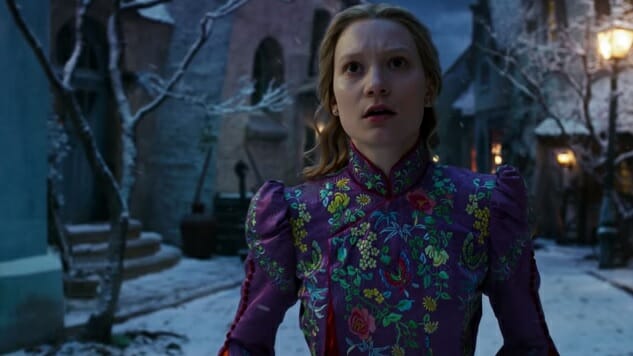Alice Through the Looking Glass

The viewing experience of Alice Through the Looking Glass is easily summarized with just three words: “Is that all?” It satisfies all of the basic requirements that satisfy the definition of “movie,” and yet as a movie it is leagues from actually being satisfying. It tells a story. It has a beginning, a middle, and an end. It has a cast. It has, ostensibly, a director, though James Bobin does not “direct” here as much as he simply does a job. Describing his approach to filmmaking as “workmanlike” would do a disservice to workmen, though, because workmen, at least, give value to our lives by breaking their backs. Bobin, by contrast, goes through motions the way a reader might listlessly turn the pages of a book.
It’s tempting to pinprick Alice Through the Looking Glass on its own literary heritage. Like Tim Burton’s Alice in Wonderland, Alice Through the Looking Glass relates to Lewis Carroll’s bibliography similar to how H.W. Plainview relates to Daniel Plainview. Burton’s and Bobin’s films share only a nominal link with their source materials, cherry-picking bits and pieces of Carroll’s words while failing to speak his language. This is more of a knock against Alice in Wonderland than Alice Through the Looking Glass, which is the beneficiary of its predecessor’s happy ignorance: We expect the latter to “get” Carroll about as much as the former did, so we’re more forgiving of, or perhaps numb to, Bobin’s detachment from the novel. (Linda Woolverton, who wrote the screenplays for both pictures, arguably bears greater culpability, but let’s leave the question of whether to shoot the messenger or its sender for another day.)
And besides, Alice Through the Looking Glass starts off with promise, as Alice Kingsleigh (Mia Wasikowska), now captain of her father’s ship three years after the events of Alice in Wonderland, steers her crew through literal dire straits while outrunning pirates on the open seas. She swashes buckles, barks out commands, and is never questioned by her men on gendered grounds, especially after she saves the day doing her favorite thing: achieving the impossible. It’s a good setup. It’s too good, in fact, which explains why it has nothing to do with the rest of the film apart from demonstrating Alice’s skill at guiding boats through treacherous waters. Once back on land, Alice finds herself constricted by the grasp of civil protocols for young ladies in Victorian England: Men, including a spurned ex-suitor, think it absurd for a woman to captain a ship, while women, including Alice’s mother (Lindsay Duncan), agree (though perhaps against their better instincts).
So naturally Alice hoofs it back to Wonderland, where the Hatter (Johnny Depp) is fallen ill after stumbling on a reminder of his late family, whom he believes to be alive. He beseeches Alice to find them, she breaks into the stronghold of the personification of Time (Sacha Baron Cohen), and temporal shenanigans ensue as Alice makes for the past to save the Hatter’s kin. The plot shift is equally jarring and unflattering to the film’s introductory themes. Alice’s real world drama stems from a cultural sexism that dictates what vocations and interests a woman is permitted to pursue. She bristles at the idea of being forced into a role chosen for her by social decree. Once she arrives in Wonderland, though, she is all too happy to surrender her agency and do as others tell her at all times. No longer is Alice the person giving orders. Instead, she’s the one following them.
-

-

-

-

-

-

-

-

-

-

-

-

-

-

-

-

-

-

-

-

-

-

-

-

-

-

-

-

-

-

-

-

-

-

-

-

-

-

-

-








































